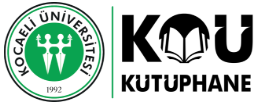Purpose
The Kocaeli University Library and Documentation Department aims to support education and research and to develop the library collection parallel to the university's teaching areas and based on users' cultural needs, both in terms of quantity and quality.
Collection Evaluation
- The library collection is regularly evaluated to ensure access to qualified, accurate, reliable, and universal information using contemporary resources for education, teaching, and research activities.
- During collection evaluation, priority criteria include meeting user information needs, improving the structure and scope of the collection, ensuring balance and currency of the collection, and effective budget utilization.
- Electronic resources are prioritized in the development of serials and thesis collections. Regardless of the method used, serials must be parallel to the university's teaching areas and continuity is maintained.
- Inclusion of physically damaged resources due to usage is also considered; decisions are made regarding repair, weeding out, or reacquisition of the resource.
- Lost resources, based on usage rates, may be reacquired following inventory processes.
- Resources that are excessively marked, have damaged or missing pages, have not been used in the last 10 years, or have excess copies, as well as outdated technological materials (floppy disks, tapes, etc.), are removed from the collection.
- The Department may prefer procurement methods such as purchasing (tender, direct procurement), subscription, or donation for collection development.
Purchase Criteria
- Collection development is carried out based on expert staff selection and member requests. Requests for works are made through the library automation system by logging into member accounts. While there is no limit on the number of requests, not all requests may be fulfilled.
- Printed work requests are processed within the available budget by the collection development unit. During evaluation, criteria such as the contribution of the source to the collection, its currency, language, publisher quality, cost, printing condition, format, etc., are considered. The borrowing rate of existing resources in the library collection is also considered.
- Second-hand sourcing is not conducted for non-printed resources. Spiral-bound and loose-leaf format resources are not preferred due to their impracticality.
- After evaluating incoming requests, lists are prepared for resources to be included in the collection, and appropriate procurement processes (tender or direct procurement methods) are initiated.
- Resources procured through tenders are acquired according to the Public Procurement Law. Due to the tender process, it may take a long time for tendered resources to be shelved.
- Requests for collected works, gathered periodically, are also procured through direct procurement within the budget allocated to the Department.
- Purchased resources are cataloged with an inventory number and forwarded to the cataloging unit. They are added to the collection after technical procedures are completed.
- Electronic resource selection is carried out by the Department based on requests from academic staff. Requests for licensed or open-access electronic resources accessible online are fulfilled within the available budget through subscription or purchase.
- When evaluating electronic resource requests, criteria such as the contribution of the source to the collection, the existence of equivalent resources, usage statistics collected during trial periods, license terms, etc., are considered.
- The renewal of existing subscriptions takes into account usage statistics; unexpected significant increases in subscription fees may lead to subscription cancellation.
Donation Acceptance and Selection Criteria
- Individuals or institutions wishing to donate must first submit a list of resources containing bibliographic information (title, author, publisher, publication year, etc.) to the Collection Development Unit of the Department and obtain approval.
- Donated resources should be appropriate for the university library's objectives and educational programs, maintaining their relevance, scientific quality, and supporting researchers socially and culturally.
- Publications showing characteristics of primary/secondary school textbooks, mimeographs, lecture notes, etc., are not accepted as donations.
- Resources that are excessively marked, damaged, or have missing/torn pages, as well as photocopied materials, are not accepted as donations.
- The Collection Development Unit decides whether donated material will be included in the collection. Acceptance of donated resources does not guarantee their inclusion in the collection; the Department may choose to share some resources with other institutions or users.
- Donors cannot claim any rights or demands related to the resources they have submitted.
- The Department has complete authority to decide how and under what rules donated resources will be made available to users within the library. Special collections or shelves disrupting the integrity of the library are not created for donors.
- Resources deemed suitable for the collection are cataloged with an inventory number and forwarded to the cataloging unit. They are added to the collection after technical procedures are completed.
Policy for Sending Donations to Other Institutions
- Resources received by the Kocaeli University libraries via donations that are not included in the collection may be sent to other requesting institutions.
- If several institutions request the same publication, priority is given to the first requester.
- Shipping costs are covered by the requesting institutions.
Detailed Information for Printed Resources: nihal.karabulgu@kocaeli.edu.tr
Detailed Information for Electronic Resources : ekaynakkutp@kocaeli.edu.tr
